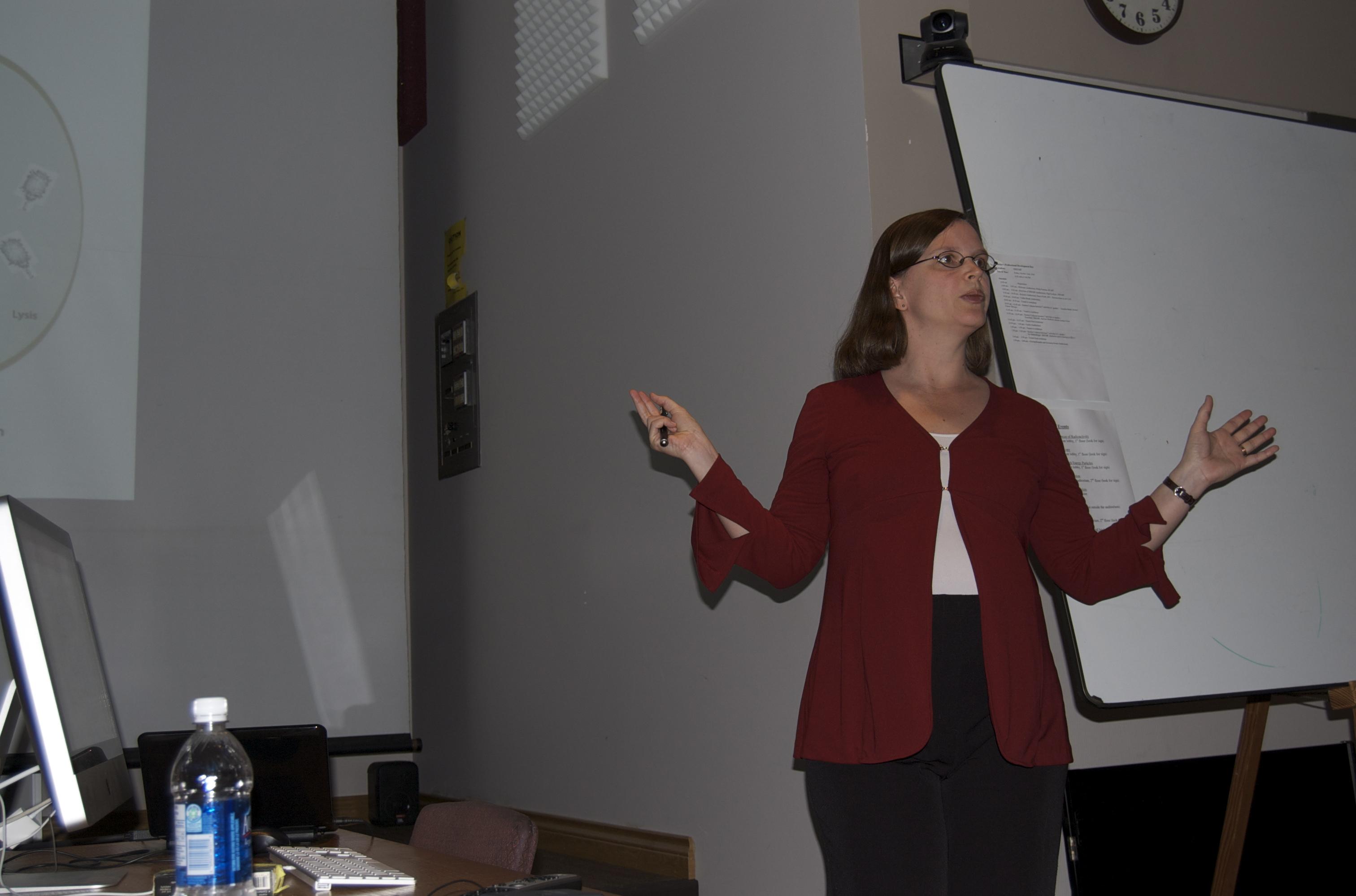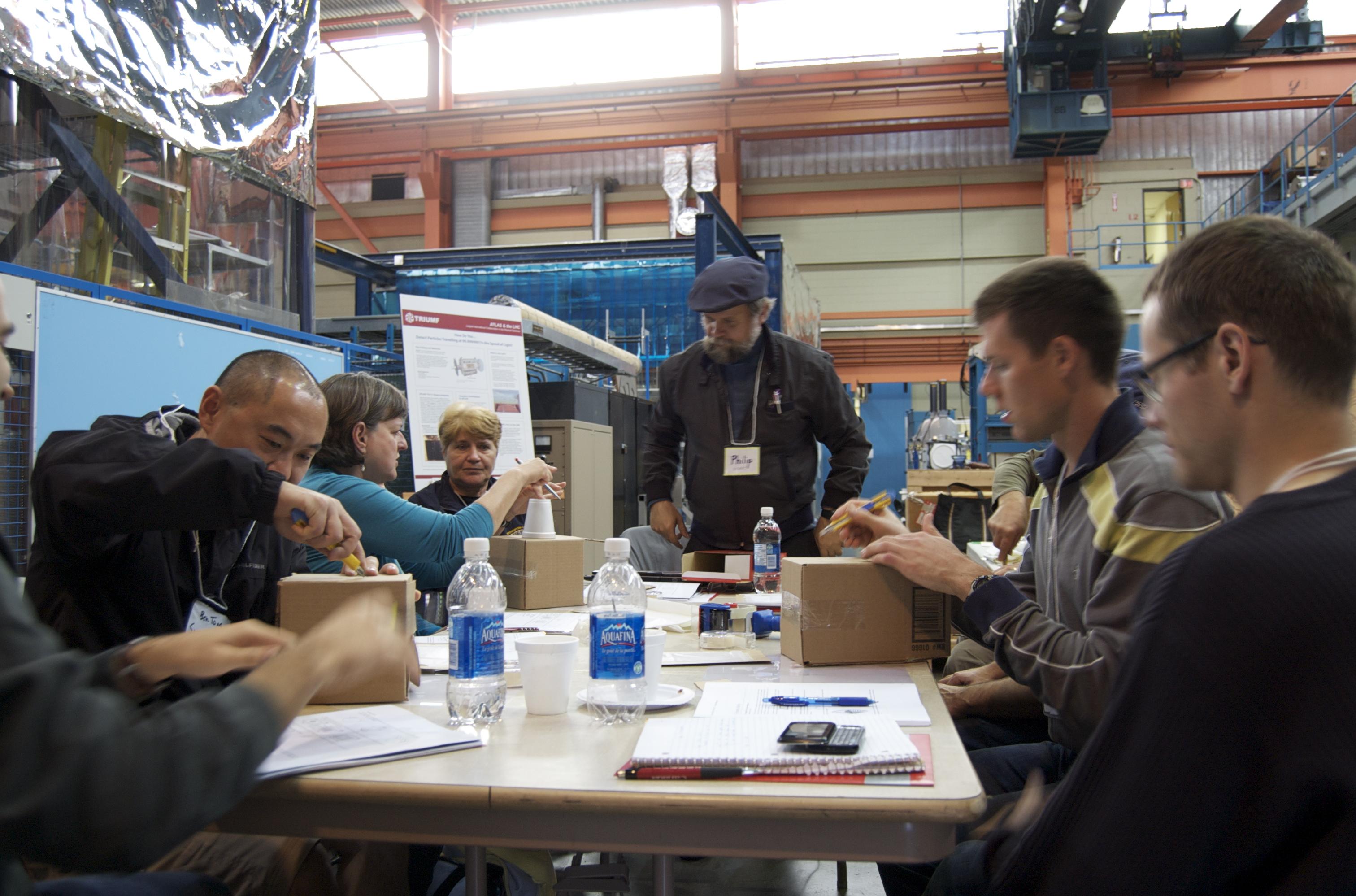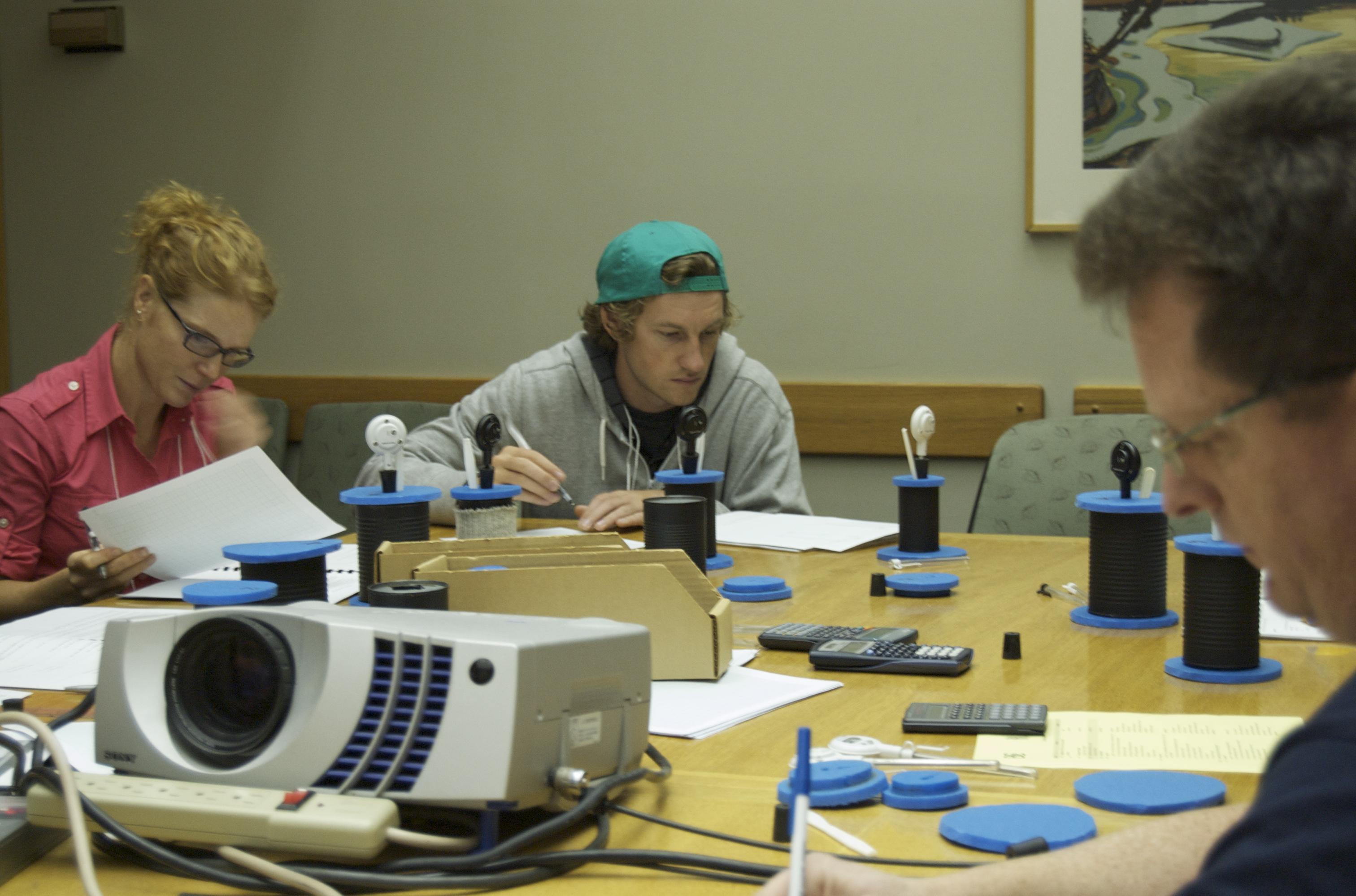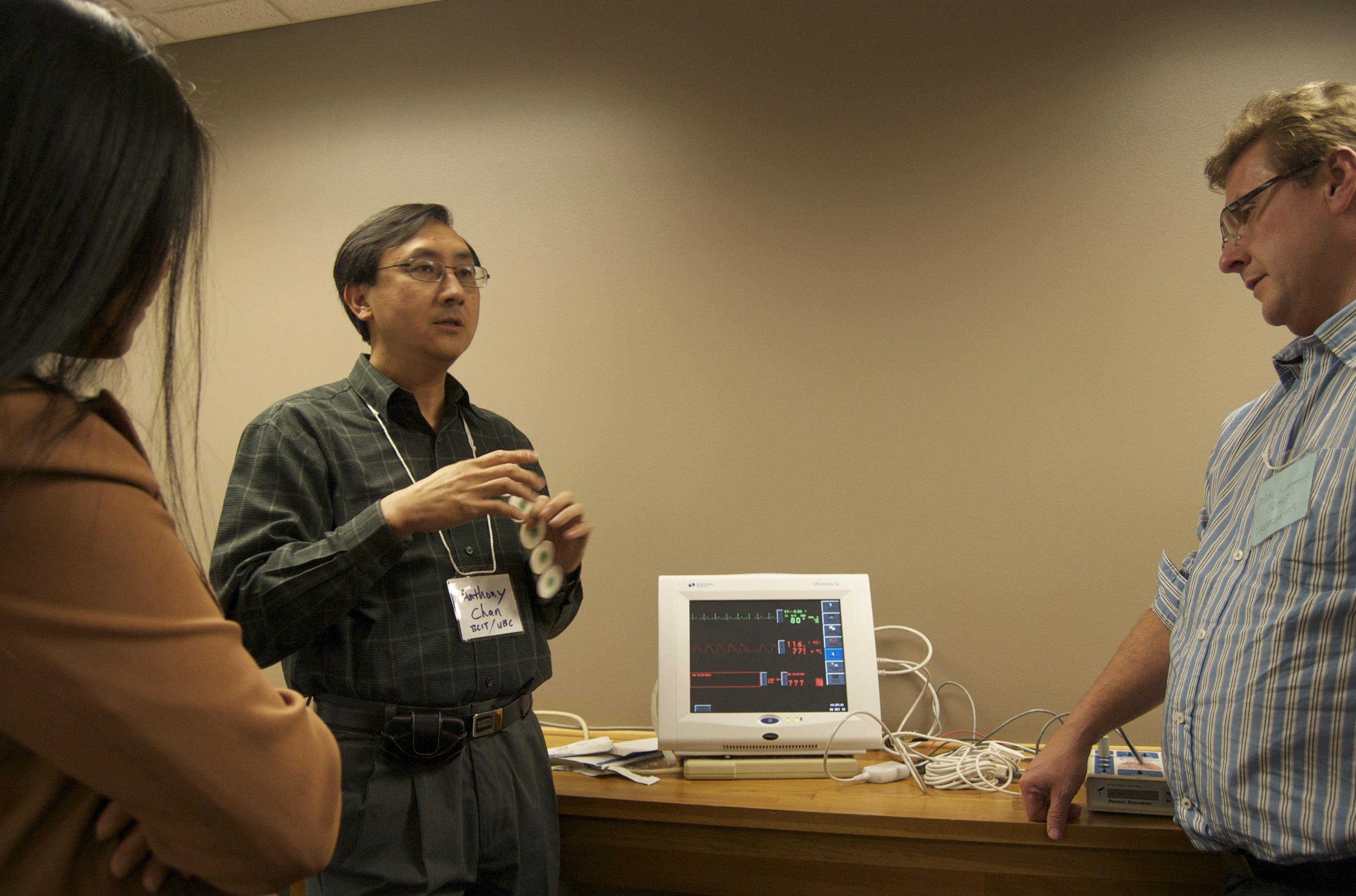On Friday, October 22, 2010, 60 British Columbia high school math and science teachers visited TRIUMF, Canada’s national laboratory for particle and nuclear physics, for the district-wide Professional Development Day.
 TRIUMF Director Nigel Lockyer gave an introduction to TRIUMF and particle physics, talking about the role of accelerators in exploring how and why the universe is the way it is. TRIUMF was the perfect facility for the group to visit for its day of scientific experiments and discussions of teaching. Nigel then gave the floor to keynote speaker Nancy Forde, the Principal Investigator of Simon Fraser University’s lab that studies single-molecule biophysics.
TRIUMF Director Nigel Lockyer gave an introduction to TRIUMF and particle physics, talking about the role of accelerators in exploring how and why the universe is the way it is. TRIUMF was the perfect facility for the group to visit for its day of scientific experiments and discussions of teaching. Nigel then gave the floor to keynote speaker Nancy Forde, the Principal Investigator of Simon Fraser University’s lab that studies single-molecule biophysics.
Nancy took the opportunity to talk about Kinesin and other ‘molecular motors’ that are used inside cells to move large molecules and proteins inside and around a cell; within the cell, the location of these molecules determine if they will function properly. She compared it to the power of optical tweezers, a technology that uses laser light to move particles, molecules, viruses, and even whole bacteria in water. The laser has a momentum, which, when transferred to an object with a higher index of refraction than water, can move the object. The audience was amazed to see a simple laser drag around living E. Coli bacteria, let go, and then watch the bacteria continue on, unharmed.
 The visiting teachers then broke into groups to visit many different demonstrations and talks with information and activities they could share with their students in the classroom. The innovative and creative demonstrations were aimed to address how physics is important and practical in the lives of students. Philip Freeman, President of the British Columbia Section of the American Association of Physics Teachers, and Richmond Secondary School teacher, led a demonstration on the optics of the eye. In this activity, teachers took cardboard boxes, tracing paper, and magnifying glasses, to slowly build up the functions of an eye to demonstrate how it works in different creatures. Simple creatures have only simple light detectors, able to tell if light is there or if it isn’t. More complex creatures have eyes that can find the source of light, produce an image, make it brighter, larger, and even adjust focus.
The visiting teachers then broke into groups to visit many different demonstrations and talks with information and activities they could share with their students in the classroom. The innovative and creative demonstrations were aimed to address how physics is important and practical in the lives of students. Philip Freeman, President of the British Columbia Section of the American Association of Physics Teachers, and Richmond Secondary School teacher, led a demonstration on the optics of the eye. In this activity, teachers took cardboard boxes, tracing paper, and magnifying glasses, to slowly build up the functions of an eye to demonstrate how it works in different creatures. Simple creatures have only simple light detectors, able to tell if light is there or if it isn’t. More complex creatures have eyes that can find the source of light, produce an image, make it brighter, larger, and even adjust focus.
In a demo by Dr. Mike Coombes, an instructor at Kwantlen Polytechnic University, teachers learned how to show students that physics affects the biological adaptations of creatures.  Teachers filled up differently sized cans with hot water to represent the body of different creatures, and graphed the rate of temperature change. Greater surface area being exposed to the outside would mean more molecules would cool down at once, so shorter, squatter cans cooled slower than long, thin ones – which is why animals that live in cold climates tend to be short and squat, with fewer large extremities, while animals of warm climates are long and lean.
Teachers filled up differently sized cans with hot water to represent the body of different creatures, and graphed the rate of temperature change. Greater surface area being exposed to the outside would mean more molecules would cool down at once, so shorter, squatter cans cooled slower than long, thin ones – which is why animals that live in cold climates tend to be short and squat, with fewer large extremities, while animals of warm climates are long and lean.
Patrick Bruskiewich made a presentation on how physics led to technology like transistors to medical imaging equipment, and at the end, Anthony Chan from BCIT showed teachers how electrodes and ECG equipment work to track a person’s heartbeat.
Teachers left inspired by the demonstrations and talks and returned to their schools with real knowledge of the physics industry. Many had never visited, or even heard of TRIUMF. They discovered that TRIUMF is a place where their students (future physicists and bio-physicists, chemists and biochemists) can find meaningful, stimulating work locally, and be surrounded by other talented, innovative people from around the globe. The participating teachers also had a chance to practice showing their students ways that they can apply high-tech science skills to investigating important questions, and solving some of the world’s critical health issues.
The participating teachers also had a chance to practice showing their students ways that they can apply high-tech science skills to investigating important questions, and solving some of the world’s critical health issues.
“The Pro-D day was, by any metric, a great success. One could see how excited people were by the environment and the chances to interact with experts and researchers,” Philip Freeman commented on the event. “It is my hope that meeting with teachers will encourage TRIUMF to continue its outstanding outreach efforts to teachers and students. I would love to see TRIUMF work together with other physics institutions to encourage our governments to not only fund this essential research but to integrate it with our teaching.”
A warm congratulations to everyone who made this event possible, and a special thank you to all those who teach.
-- Jessica Coccimiglio, Communications Assistant
